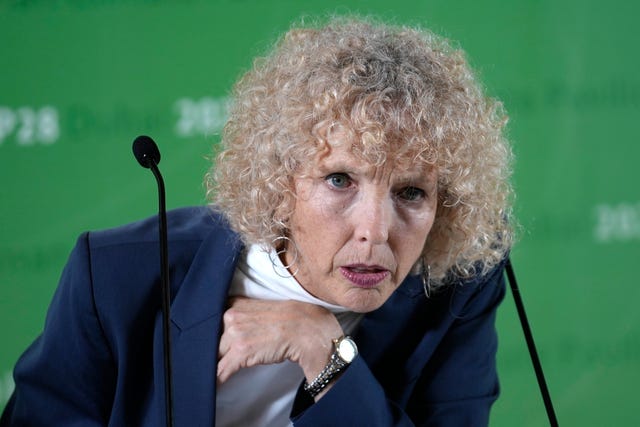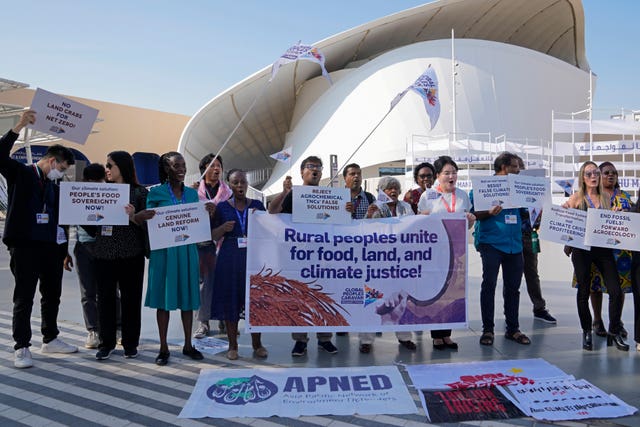Cop28 climate talks face roadblocks following first day of rapid action
There has been some debate over terms such as ‘phase-out’ in relation to fossil fuels.

After a first-day blur of rare quick action and agreement, negotiators at the United Nations’ Cop28 climate summit finished up their first week in a more familiar place for them: the murky middle, where momentum can meet roadblocks.
German climate envoy Jennifer Morgan told delegates in Dubai: “Negotiations, as are often the case, are a mixed picture right now.
“We see big differences between individual states in some areas, but there is a will to make progress.”
Proponents who are calling for a ground-shifting phase-out of fossil fuels like oil, gas and coal have hope for the first time in years, but also see where it could be torpedoed.
Key issues of financial help for poor nations to decarbonise and how to adapt to warming need much more work, officials said.
That is in contrast to the first day when the conference put into effect a climate compensation fund – called loss-and-damage – and started seeing its coffers grow to more than 720 million dollars (£570.5 million).
UN climate secretary Simon Stiell warned against putting “a tick on the box” for that victory and thinking it solves the multitrillion-dollar problem of financial aid that is needed to help cut emissions worldwide.

“We need Cop to deliver a bullet train to speed up climate action. We currently have an old caboose chugging over rickety tracks,” Mr Stiell said.
Adnan Amin, the number two official in the Cop presidency and a veteran United Nations diplomat, was a bit more optimistic, saying all negotiations have their ups and downs.
At this point, he said, “there’s still a buzz. There’s still positivity”.
Discussions have been focused on the so-called Global Stocktake – a status of where nations are at with meeting their climate goals to limit warming to 1.5C compared to pre-industrial times and how they can get there.
On Tuesday, negotiators produced a new draft of the text, but it had so many possibilities in its 24 pages that it did not give much of a hint of what will be agreed upon when the session ends next week.
Negotiators for 197 countries are going over the document word by word to see what they can live with and what they cannot, Mr Amin said: “They have so many demands and needs. But I think it provides a very good basis for moving forward.”
Cedric Schuster, the chair of the Association of Small Island States, said failing on the global stocktake would “make it significantly more difficult to leave this Cop saying we can achieve the 1.5C limit.”
He said major emitters and developed countries need to take the lead and ramp up efforts to phase out fossil fuels.
“If we fail, the consequences will be catastrophic,” he said.
While United Nations officials highlight worries about finance and adaptation, many at the Dubai conference are focused on language about what to do about fossil fuels. Burning coal, oil and natural gas are the chief causes of climate change.
For the first time in nearly three decades of talks, the idea of getting rid of all of three of them is on the agenda and a serious possibility.

But issues about language, timing and meaning – especially defining terms such as “phase-out” – are far from settled. One term under debate was “unabated”, when placed in front of fossil fuels. When asked to define “unabated,” Mr Stiell said that it was up to negotiators.
Environmental activist Romain Ioualalen of Oil Change International pointed to 106 nations signing a document calling for a phase-out, which was mentioned by many world leaders when they made speeches in the first few days.
“We have seen options about fossil fuel phase-out in the text. And while it’s historic to have them, they’re not enough.
“The situation we’re in right now, it was unthinkable just three Cops ago to have these debates on the phase-out of all fossil fuels.
“There’s definitely momentum in the conversation. There’s definitely opposition, of course. And that’s to that’s to be expected. But that’s what we need to solve.”
“We’ve never been closer to an agreement for sure,” he added.
Mr Ioualalen said Saudi Arabia, Iraq and Turkey seem clearly against fossil fuel phase-out language.
Jason Bordoff, director of the Centre on Global Energy Policy at Columbia University, said: “If there is some disagreement between ‘phase-out’ and ‘phase-down’, let’s all agree there should be no disagreement that oil demand in 2050 has to be a fraction of what it is today, if not zero.
“We are fighting over ‘phase-out’ or ‘phase-down’ while oil demand is rising each year.”
Wednesday’s sessions will focus on transport, the second-leading sector for the carbon dioxide emissions warming the planet, with panels like building out EV charging infrastructure and decarbonising urban freight transportation.





